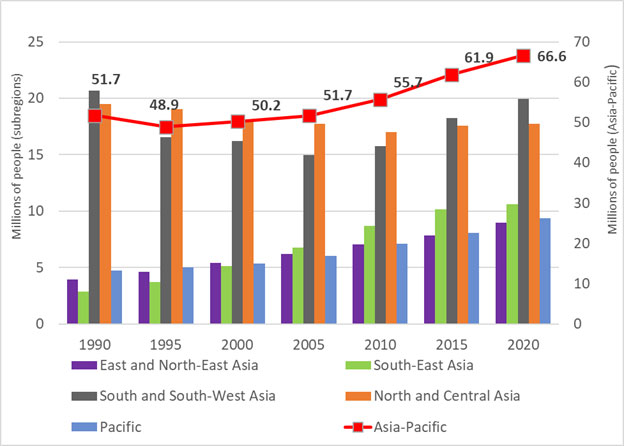BANGKOK, Thailand, Sep 08 (IPS) – In Asia and the Pacific, migration is again on the rise. In 2020, almost 109 million people lived in a country other than that of their birth. They represented 2.3 per cent of the region’s population in 2020 and almost 38 per cent of the world’s international migrants.
If managed properly, migration can benefit migrants, their families, as well as both the countries they come from and go to.
Growth in the international migrant stock in Asia and the Pacific and by subregion, 1990—2020

Migration is largely a result of disparities
Development disparities are a key driver of international migration. Poverty, limited job opportunities, recently exacerbated by rising food and energy prices, and the prospect for higher wages abroad are main contributors to the decision to migrate.
Migrants work in jobs of all skill levels: construction and domestic workers, nurses, accountants, computer scientists, teachers and many others. Women are particularly engaged in domestic and care work.
Migration primarily occurs within the region. People often prefer to migrate to countries with geographic and cultural proximity. The region features distinct migration corridors, such as from Central Asia to the Russian Federation, from Pacific islands to Australia or within South East Asia.
Temporary labour migration from Asia and the Pacific to the Middle East is significant too, with Bangladesh, Indonesia, Pakistan and the Philippines as the main countries of origin. Overall, Asia and the Pacific is a hub for international migration; many countries are simultaneously countries of origin, destination and transit.
Millions of young people from the Asia-Pacific region also migrate to study abroad. After completing their degrees many of them gain work visas and employment in their country of destination, such as Australia or New Zealand.
Migration without choice
Other people have no choice but to migrate. They flee their countries due to war and conflict. In 2022, there were 31.6 million refugees from Asia and the Pacific under the mandate of UNHCR and 27.5 million of them were living in the region.
A total of 53 per cent of refugees from Asia-Pacific countries are female and 43 per cent are under 18 years old. Countries such as Bangladesh, Islamic Republic of Iran, Pakistan, and Türkiye are among the largest host countries of refugees in the world for refugees from neighbouring countries in conflict. An increasing number of people migrate for environmental reasons and climate change because they see their livelihoods being destroyed.
Migration comes with a high cost for migrants
Despite the gains, migration comes at a high cost for migrants. Recruitment costs to private recruiters remain high. Some pay with their lives: Since 2014, every year, an estimated 4,000 deaths have been recorded worldwide on migration routes.
Each year, thousands of men and women fall prey to traffickers and smugglers, often for forced labour and sexual exploitation. Access to social services and protection, as well as rights, in destination countries often remain limited, particularly for workers classified as low skilled, including domestic workers. Women migrants are at higher risk of being abused and find limited access to sexual and reproductive health services.
Migrants are agents of development
Migrants typically send back cash or goods to support their families in their country of origin, known as remittances. In 2022, a total of $311 billion was sent to Asia and the Pacific as remittances, which support better housing, nutrition and better education for children. In countries of destination, migrants perform jobs that often could not be filled otherwise. Migrant workers are essential to many sectors in the economy, particularly in ageing societies.
Migration is an irreversible trend in the Asia-Pacific region. To harness the benefits, safe and low-cost pathways for regular migration are needed. There is also a need to address development disparities, conflict and environmental degradation to ensure that migration is people’s individual choice. Regional dialogue and cooperation on international migration is crucial to this end.
The Seventh Asian and Pacific Population Conference, organized by ESCAP and UNFPA, in Bangkok from 15 to 17 November 2023, will provide opportunities for policymakers, civil society organizations and other stakeholders to discuss key population and development issues.
The meeting’s outcome will provide the regional input to the global review of the Programme of Action of the International Conference on Population and Development (ICPD) at the 57th session of the Commission on Population and Development, in 2024.
Vanessa Steinmayer is Population Affairs Officer, Social Development Division, ESCAP and Simon Graham is UNFPA Fellow on Population and Development.
IPS UN Bureau
Follow @IPSNewsUNBureau
Follow IPS News UN Bureau on Instagram
© Inter Press Service (2023) — All Rights ReservedOriginal source: Inter Press Service
Check out our Latest News and Follow us at Facebook
Original Source
